Sustainable Construction
NET ZERO 2040
Queen’s University is committed to ensuring sustainability is incorporated into every aspect of its operations.
A Net Zero future is Queen's University Belfast's main environmental goal, with our Net Zero Plan launched in 2023.
The University targets Passive House certification and BREEAM ‘Excellent’ on all projects greater in value than £1M. For projects less than £1M, Passive House will be considered against criteria including ‘value for money’ and University outcomes.
The University targets EnerPHit certification and BREEAM ‘Very Good’ for all projects greater in value than £1M. SKA ‘Gold’ Rating is targeted for all fit-out projects below £1M.
Aim 1: Re-Use, Retrofit and Refurbishment of Existing Buildings over Construction of New Buildings
Aim 2: Reinforce Queen's Sustainable Construction Guide
Aim 3: Setting Design Stage Targets - Carbon Reduction, Passivhaus, Circular Economy Principles
Aim 4: Develop a Sustainable Construction Policy for Life Cycle Analysis
Aim 5: Review Net Zero Targets for Capital Works Projects
Aim 6: Review Scope 3 Data and Develop Methodology to Monitor Contracts
Aim 7: Collaborate to Stimulate Action in Supply Chains
Aim 8: Transition to Net Zero Supply Chains where Possible
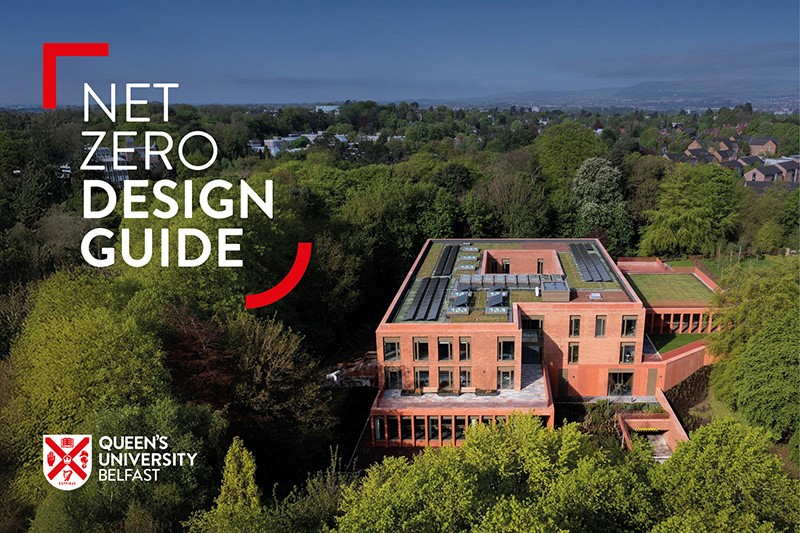
The University's Net Zero Design Guide was published in 2023 and provides an action plan to create a sustainable, healthy campus for our community.
This design guide seeks to provide steps by which to transition from 'business as usual' towards a new 'Net Zero Approach' in accordance with the commitments of the University's Net Zero Plan launched in November 2023.
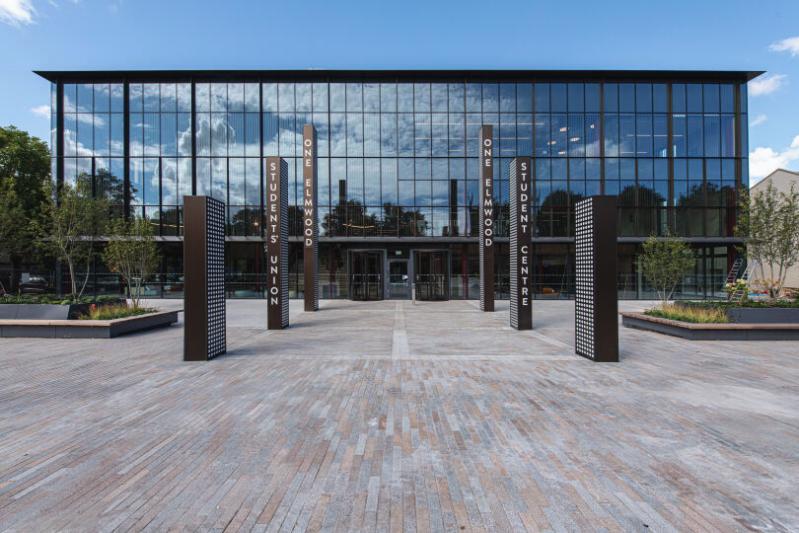
One Elmwood opened in 2022, providing a new state-of-the-art building that brings together student services with the Students' Union.
One Elmwood was rated BREEAM 'Very Good' and the building includes:
- Fitted glass to reduce solar glare.
- Roof mounted PV array providing on-site renewable energy
- Use of Passive ventilation
- Sedum green roof to promote biodiversity
-800x533.jpg)
A new 6,000 square metre innovative building called the Queen's Business School Student Hub sits alongside the listed red-brick Riddel Hall, as the new base for a vibrant student and staff community.
The Student Hub was completed in 2023 and was rated BREEAM 'Excellent'. A range of sustainability initiatives were incorporated into the build:
- Geothermal Heating System to provide space heating / cooling
- Roof mounted PV array providing on-site renewable energy (electric and hot water)
- Wildflower roof to promote biodiversity
- Swift boxes integrated in façade with calling system
- EV charging points for vehicles/bikes
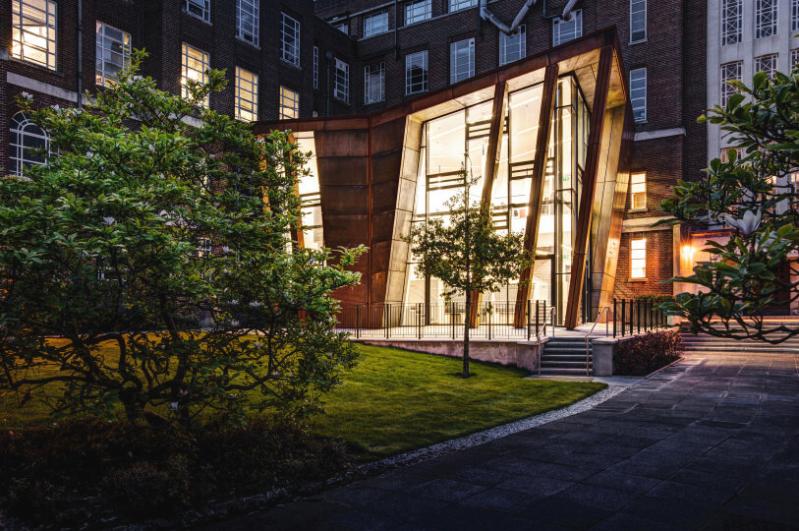
SKA ‘Gold’ Rating is targeted for all refurbishment projects below £1M
Refurbishment works are ongoing within Queen's University listed David Keir Building to provide upgraded facilities for the School of Natural Built Environment, Civil Engineering Department. A key aim within this project is to achieve our first SKA ‘Gold’ rating.
.png)
Queen's University new accommodation on Dublin Road will be a Passive House building.
Construction for Queen's first Passive House building has commenced with it due for completion in 2026.
It will be Passive House 'Classic' and BREEAM 'Excellent' with air source heat pumps to provide space heating/cooling and hot water generation. Climate adaptation measures have also been incorporated in the form of a blue roof.
 .png)
Momentum 1 Zero is part of the Belfast Regional City Deal.
The building will be BREEAM 'Excellent' and will include a range of sustainability features:
- Data-centre heat recovery system
- Air Source Heat Pumps to provide space heating / cooling and hot water generation
- Roof mounted PV array providing on-site renewable energy
- EV charging points for vehicles/bikes
- Minimal demolition & re-use of existing building (embodied carbon saving against all new build)
 .png)
BRCD Advanced Manufacturing Innovation Centre (AMIC) is part of the Belfast Regional City Deal.
The building will be BREEAM 'Excellent' and will include a range of sustainable features. This includes smart metering, air source heat pumps, renewable technology, mixed mode ventilation solution, EV charging, Sustainable Drainage Systems and landscaping which will enhance biodiversity.
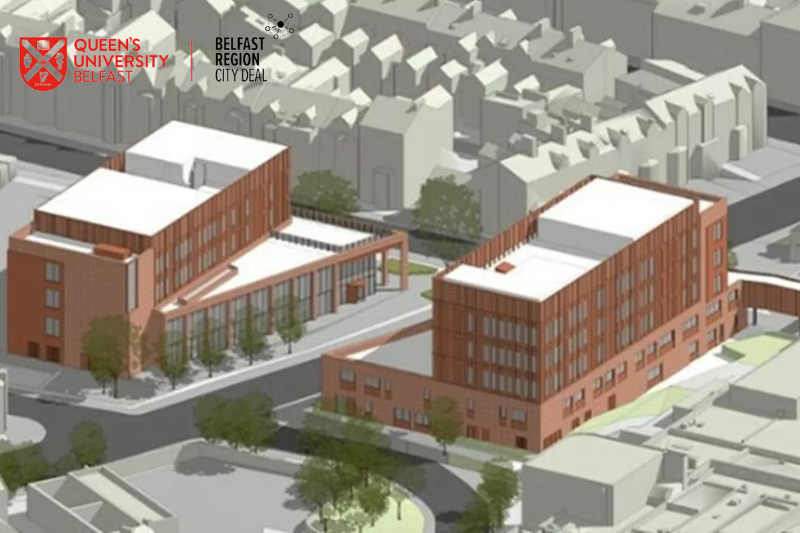
BRCD Institute for Research Excellence in Advanced Clinical Healthcare (iREACH Health) is part of the Belfast Regional City Deal.
The building will be BREEAM 'Excellent' and will include a range of sustainability features such as smart meters, air source heat pumps, swift boxes and EV charging points.
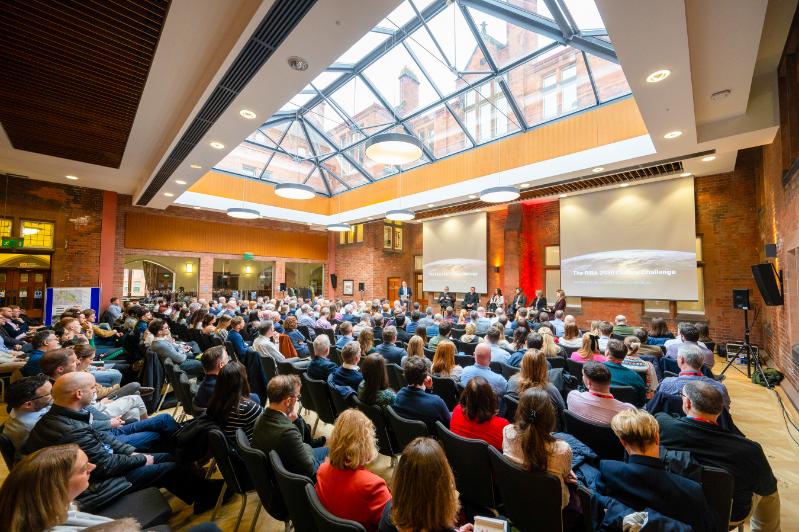
The University is committed to ensuring the construction sector has the opportunity for dialogue and sharing of best practice, enabling continual progress to be made in greening our infrastructure.
Our annual Sustainability Construction Conference takes place every February in Queen's University. A range of experts join us for a line up of talks, panel discussions and debates.
2025: 'Refurb Renaissance: Prioritising The Re-use of Buildings in Transition to a Net Zero Future'.
- Queen's Sustainable Construction Conference 2025 Part 1
- Queen's Sustainable Construction Conference 2025 Part 2
2024: 'Carbon Reduction in Buildings: A 'How To' For Designers, Owners & Users'.
